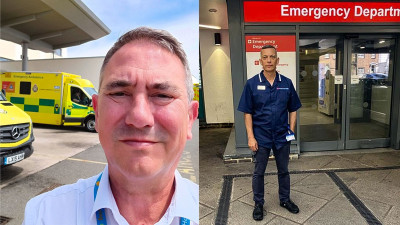
It was a horrifying moment in our capital's history but 20 years on, two members of staff on shift at the Royal Free Hospital that day reflect on how it really did demonstrate 'the best of the NHS'.
Ashley Baruah, clinical practice educator for the Royal Free Hospital emergency department, was a band six nurse at the time of the attack.
He said that before 9am rumours of a power issue on the tube started circulating – although no one thought much of it at the time.
Ashley said: “There was a TV in one of the offices so we were following things on the news, and gradually it became apparent that things were more serious than that.”
It was around 40 minutes later that they got the call from the London Ambulance Service that this was now a major incident and the hospital was to put their major incident plans into action.
Nick Vincent, now a general manager for the emergency department, acute medicine and care of the elderly at North Middlesex University Hospital, was a bed and site manager at the Royal Free Hospital on the day of the attack.
He said: “I clearly remember the moment still, like it was yesterday. My bleep sent out the crash alert sound the familiar switchboard voice said three times ‘major incident declared’. I knew then it was not going to be a usual day.”
Nick said there was a heroic effort from local authorities, system partners and patient transport to get patients home and make room for new patients arriving.
Ashley added: “At this point we were in the process of clearing our emergency department and so we were in a really good situation. The first patients arrived at 10.10am and then more and more started coming through. Many of them had horrendous injuries – missing limbs, fractured skulls, shrapnel wounds, burns.
“Every time a patient left the department, a new one would arrive. It was pretty relentless and there was no opportunity to have a break. But we had a job to do and everyone just cracked on with it.”
Ashley said that one of the challenges they faced that day was trying to communicate between different sides of the department because the phones would not stop ringing with people looking for their loved ones.
"In the end we got some ward staff to act as runners and help us get messages," he said.
Ashley had an additional concern that day – he knew that his wife was due to be travelling to work on the same tube line on which one of the bombs exploded.
“Whenever I had a chance I was trying to ring my wife – but the phone network had gone down.,” he said. “Eventually I managed to get through to her at about 4pm. She said her train had been just ahead of the one with the bomb on it and she could feel the blast.”
Nick added: “What we hadn’t expected was the sheer volume of calls from people looking for loved ones and that included every embassy and consulate in London looking for their own nationals.
“Although it was a truly shocking event, what it showed was the best of the NHS and indeed the people of London. I will never forget that day, and the people and families affected and who must still be affected to this day and by the anniversary.”
Image: Nick Vincent (left) and Ashley Baruah
 Translate
Translate